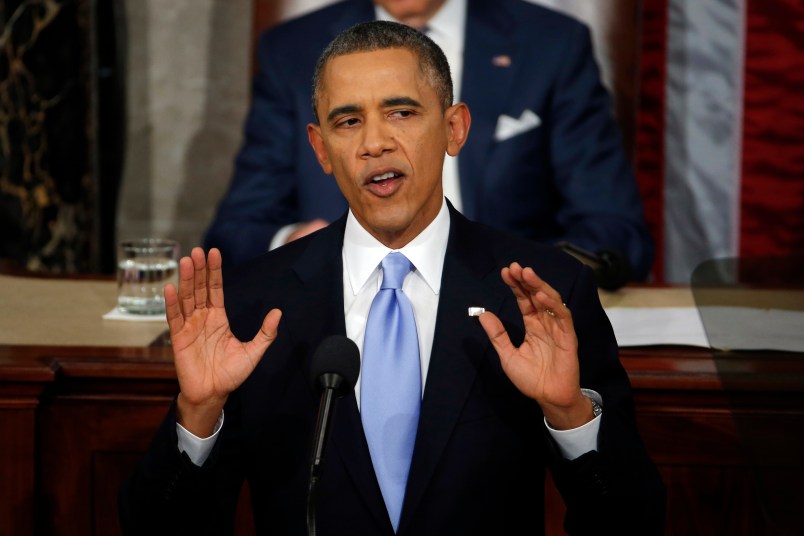Underlying the optimistic rhetoric of President Barack Obama’s annual State of the Union speech was a palpable fear about the fading American dream — an uneasy concoction of eagerness to solve the problems plaguing America and a masked fatalism about the Republican blockade of his agenda.
But he sought to morph the fatalism into hopefulness, vowing that if they refuse to work with him, he’ll do everything he can to take action on his own.
The American ideal of work hard, get ahead has “suffered some serious blows,” Obama said before a packed House chamber of legislators, cabinet officials and other guests on Tuesday night. Indeed, surging income inequality has cast a dark cloud over Americans at the lower rungs of the economic ladder, and social mobility has flatlined in the last decade.
“Today, after four years of economic growth, corporate profits and stock prices have rarely been higher, and those at the top have never done better. But average wages have barely budged. Inequality has deepened. Upward mobility has stalled,” the president said. “The cold, hard fact is that even in the midst of recovery, too many Americans are working more than ever just to get by – let alone get ahead. And too many still aren’t working at all. Our job is to reverse these tides.”
He acknowledged that he cannot get the job done alone, but promised to do what he can with his executive powers as long as his legislative initiatives continue to be stymied. “Some require Congressional action, and I’m eager to work with all of you,” he said. “But America does not stand still – and neither will I. So wherever and whenever I can take steps without legislation to expand opportunity for more American families, that’s what I’m going to do.”
Before the speech, senior administration officials fleshed out a series of executive actions that Obama intends to take in 2014 — including raising the federal minimum wage for contractors, enhancing fuel efficiency standards, giving middle class-workers more retirement savings options and investing in manufacturing institutes.
It was an earthly speech conscious of the political reality he faces: A Republican Party determined — and empowered, especially in the House — to revoke his prescriptions to heal the wounded American dream. While he repeatedly pleaded with them to work with him and his party to find common ground on goals like extending unemployment compensation and raising the minimum wage, he didn’t seem to be getting his hopes up.
“The question for everyone in this chamber, running through every decision we make this year, is whether we are going to help or hinder this progress,” he said. “[W]e know our opportunity agenda won’t be complete – and too many young people entering the workforce today will see the American Dream as an empty promise – unless we do more to make sure our economy honors the dignity of work, and hard work pays off for every single American.”
The president called on Congress to complete immigration reform, refraining from launching any attacks on Republicans who have stalled the effort. His gentle touch — after a year of dithering by House GOP leaders — signals that he prefers a policy achievement over preserving the issue as a political weapon.
“Republicans and Democrats in the Senate have acted,” he said. “I know that members of both parties in the House want to do the same.”
Returning to his theme of income inequality and the American dream, Obama drew upon his own experience rising through the social ladder and alluded to House Speaker John Boehner’s (R-OH) success story.
“It’s … how the son of a barkeeper is Speaker of the House; how the son of a
single mom can be President of the greatest nation on Earth,” the president said. “Opportunity is who we are. And the defining project of our generation is to restore that promise.”
Boehner, sitting just behind Obama, responded with a thumbs up.






